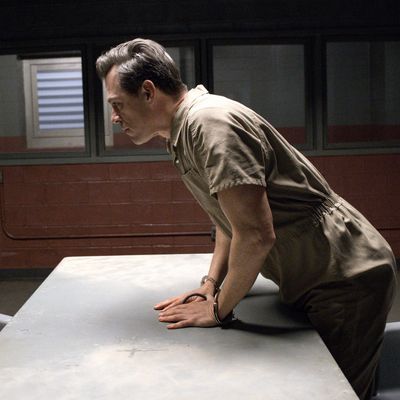
Evil’s first episode opens with forensic psychologist Kristen Bouchard (Katja Herbers of Westworld) questioning a man who has been accused of several murders. That initial setup and the fact that Evil, which debuts Thursday night, is airing on CBS make it easy to mistake this series for just another network crime procedural, the sort of thing you can half-watch while folding laundry or paying bills online. But Evil has two things going for it that most shows like this do not: Michelle and Robert King, its creators and the same pair responsible for The Good Wife, The Good Fight, and the late, great BrainDead, with which Evil shares some common ideas.
With the Kings pulling the strings, Evil clearly isn’t just another standard procedural. For one thing, it’s not strictly a crime series. When it’s suggested that the alleged murderer may be possessed by a demon, Kristen comes in contact with David Acosta, a priest-in-training played by Luke Cage’s Mike Colter (hot priests: they’re all the rage!) and a carpenter named Ben (Aasif Mandvi). David and Ben work on behalf of the Catholic Church to gauge whether seemingly supernatural phenomena — possessions, miracles, ghosts — are legitimate or explainable based on science and logic. Kristen, the skeptic and lapsed Catholic, winds up partnering with them, putting her psychological skills to use in a context that differs from her usual gig as a frequent expert witness for the district attorney’s office.
There are moments when Evil plays like a work of horror. Among other things, Kristen starts having nightmares about a demonic presence that may or may not actually be stalking her, which leads to some real goosebump-inducing moments in the pilot. One of the things Evil excels at is freaky scares; like BrainDead, it’s also not shy about getting a little spooky.
When Kristen makes appearances in court, the show adopts the feel of a legal drama, a genre the Kings know well from The Good Wife and The Good Fight. When the investigations by Kristen, David, and Ben involve the potential commission of a crime, that procedural vibe once again takes center stage. Kristen also has four young daughters that she’s parenting while her husband is leading a climbing expedition on Mount Everest. When Kristen spends time with her girls, or her extremely permissive mother (Christine Lahti) who often babysits, Evil veers into family drama territory.
But Evil never feels unfocused. It shifts between tones easily and authoritatively. Some series take a while to find their footing and rhythm. Based on the first four episodes, Evil is immediately confident in its multifaceted identity and interest in raising ideological questions, giving it a depth too often lacking in broadcast television. With its science versus faith premise, Evil is really an exploration of what constitutes good and bad behavior and why some people are rewarded and some are not. Even though it’s a wildly different show, on that point, it shares a lot in common with another Thursday night series: NBC’s The Good Place.
To Evil’s credit, it treats both the faithful and the agnostic with equal respect. The show’s trio doesn’t resolve each case in black-and-white terms, either. There’s usually a rational explanation for some of what happens, and an element that suggests powers from the great beyond may have a hand in things, too. That sense of mystery, as well as some mysteries in the characters’ personal lives, are persuasive reasons to keep watching.
Also persuasive: the cast. Katja Herbers is convincingly buttoned-up and compassionate as Kristen, and she and Colter — who, as the episodes progress, makes it clear that David is bottling up some feelings, too — share an easy chemistry together. Mandvi, known mostly for his wry comedy, fits nicely into the role of low-key cynic. And then there’s Michael Emerson, who appears as the recurring Dr. Leland Townsend, an enemy of everything for which our protagonists stand. Also a forensic psychologist, Townsend might be an actual human manifestation of evil, one who makes it his mission to undo every conviction that Kristen’s testimony secures for a guilty suspect. Just as he was on Lost, Emerson is very, very good at being manipulative and slippery.
If the idea of someone undoing the good works of others reminds you of contemporary politics, well, that’s presumably on the Kings’ minds as well. But unlike The Good Fight, which transparently tackles the Trump era, Evil addresses the current cultural atmosphere in less direct but equally valuable ways. When people argue about politics, often they’re ultimately asking questions about ethics and whether society has lost its moral compass. Those are the same questions that Evil is asking, and they make the show both of the moment and of any moment. The desire to understand why bad people do what they do is, after all, timeless.


